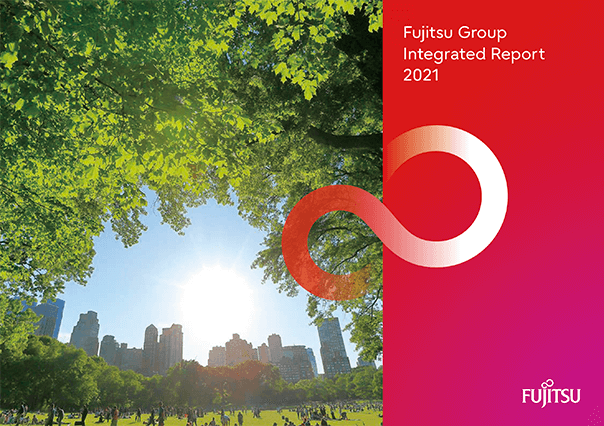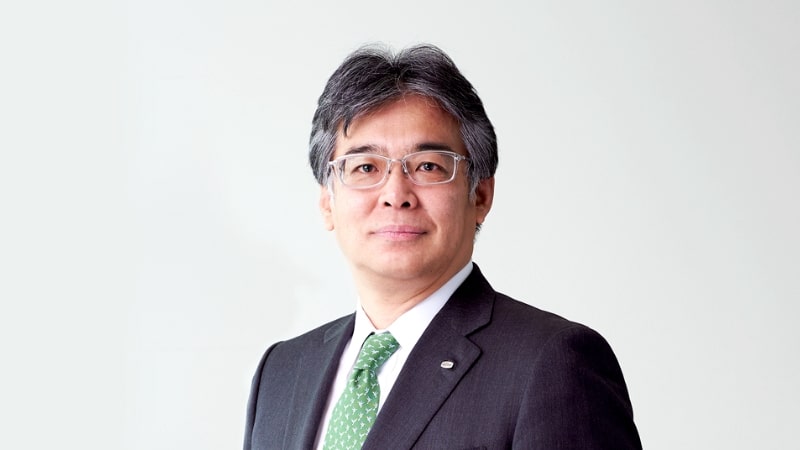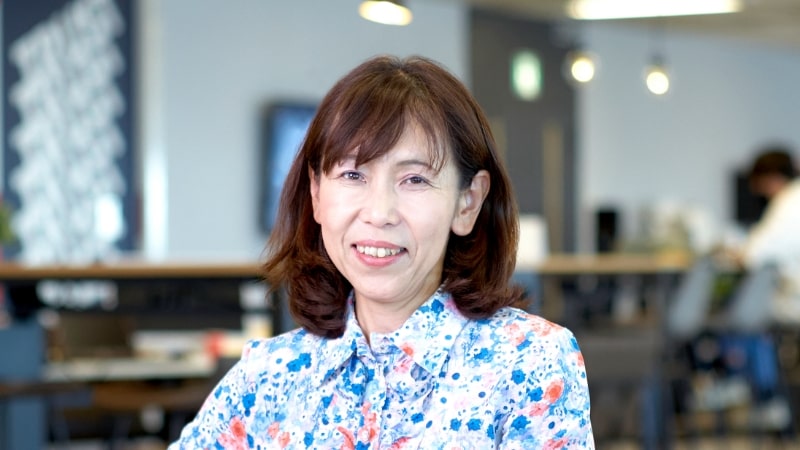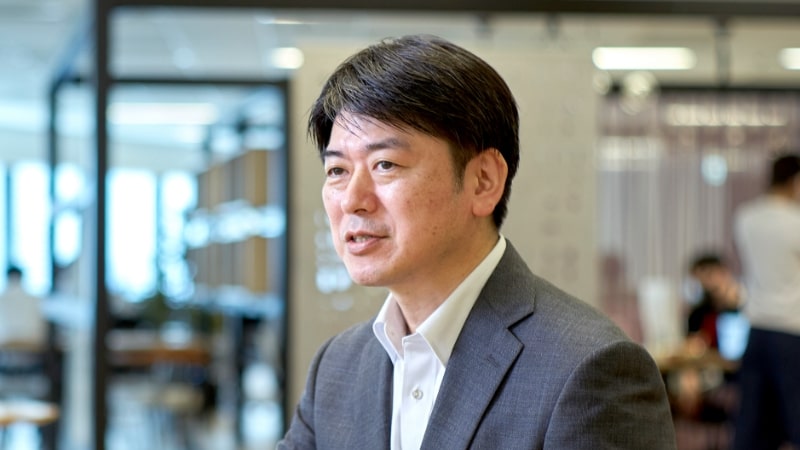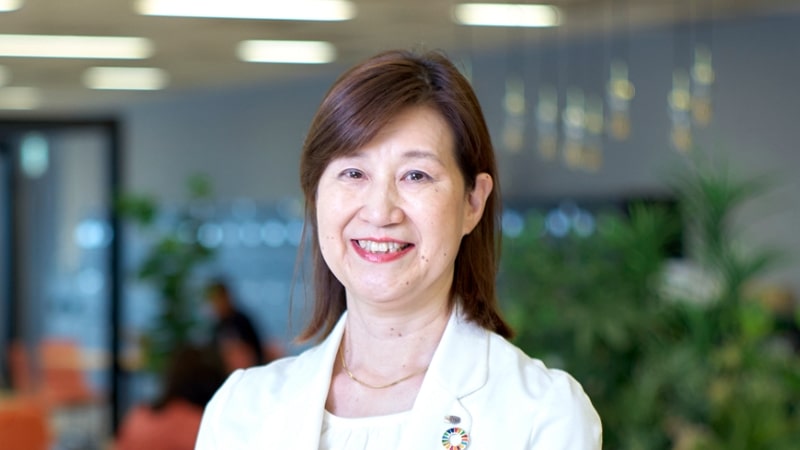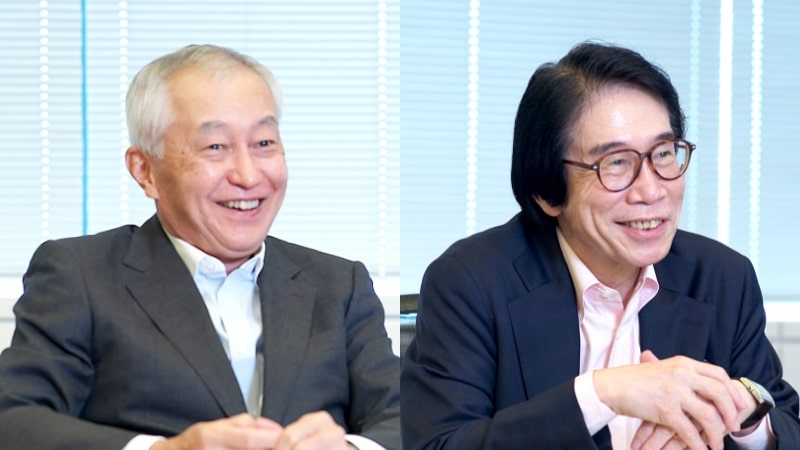Message to Shareholders and Investors
Through the pursuit of Our Purpose,
we will embrace new challenges
that go beyond existing frameworks
and strive for the creation of
value that only Fujitsu can provide.
Takahito Tokita
Representative Director
CEO, CDXO
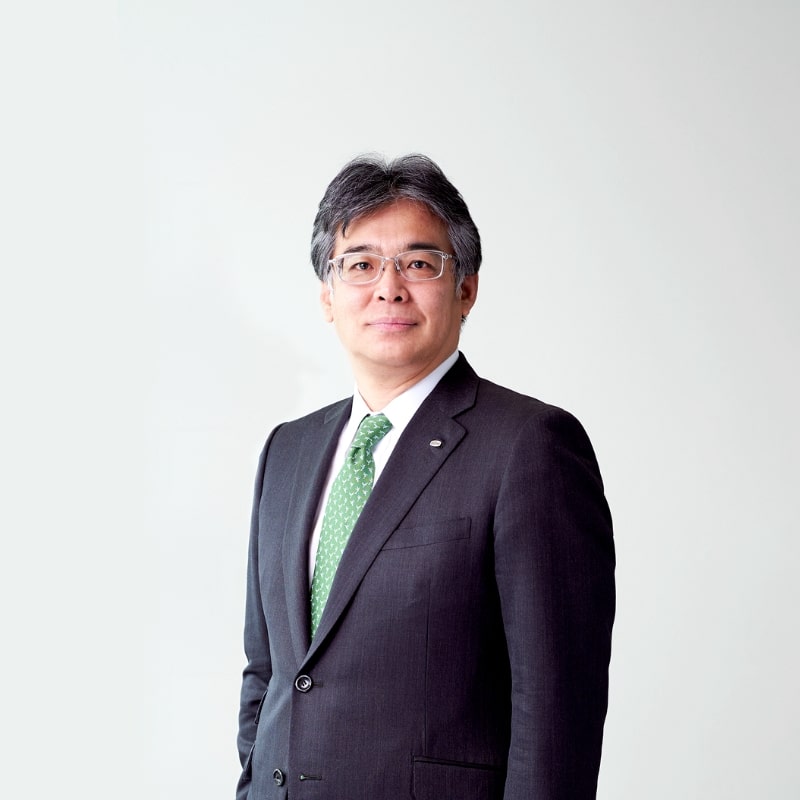
Providing Value Guided by Aspiration, Trust, and Empathy
The Fujitsu Group’s Purpose is to make the world more sustainable by building trust in society through innovation. Our starting point is to work with our customers and other stakeholders to find ways to overcome the challenges that society faces. However, in order to build a relationship of trust with our stakeholders through the challenge of solving problems, we must have true empathy for the problems that society faces and for the demands for their solutions. I believe that repeating the cycle of Aspiration, Trust, and Empathy will lead to the provision of new value and our own sustainable growth.
The world faces wide-ranging challenges, including economic disparities between countries that have come to light as a result of the race to secure sufficient supplies of vaccines, climate change that is causing increasingly severe natural disasters around the world, the emergence of geopolitical risks including the economic decoupling between the United States and China, and the disruption of supply chains globally. Underlying my emphasis on the cycle of Aspiration, Trust, and Empathy is a sense of crisis—unless each and every one of us asks themselves how they can contribute to solving social issues and achieving the outcomes outlined by initiatives like the SDGs through our business, and seeks to take on these challenges, not only will the Group struggle to continue creating value in the future, but more importantly, the world will face increasingly dire challenges in the years ahead.
This sense of crisis really hit home with the outbreak of COVID-19. Our group has been providing services to local governments and the healthcare sector for many years, but as COVID-19 brought to light the lack of a mechanism for hospitals, health centers, and local governments to share information in an efficient and timely manner, it became clear that we had not been deeply aware of this issue and had not proposed measures to solve it to a wide range of customers. This caused us to reevaluate our approach to date and was a moment of deep self-reflection.
Pursuit of the Fujitsu Group’s Unique Value Creation
Turning this sense of regret and crisis into constructive energy, we are focusing on delivering value to customers in the two business domains of “For Growth” and “For Stability.” With “For Growth,” which represents the domain in which we contribute to the transformation and growth of our customers’ businesses, we are promoting digital transformation (DX) to create new businesses using data, and “modernization,” which involves replacing and upgrading conventional IT systems by shifting them to cloud-based services. In the “For Stability” domain, we contribute to the stable operation of our customers’ IT infrastructure through the maintenance and operation of conventional IT systems and the provision of related products.
In April 2021, as we entered the second year of our “For Growth” and “For Stability” business strategy, we also identified seven Key Focus Areas that will drive the “For Growth” business domain. Of the seven areas, we defined three Horizontal Areas—Digital Shifts, Business Applications, and Hybrid IT—as the foundations of the digital technologies and services that are essential to supporting our customers’ DX. Based on this foundation, we provide services that generate high added value in the four Vertical Areas of Sustainable Manufacturing, Consumer Experience, Healthy Living, and Trusted Society, pursuing a cross-industry approach based on the ideal state of society and the issues that need to be addressed to realize it.
The examination of the Key Focus Areas began with a vision of the world in 2030, and we imagined the future of society and the activities of companies and local governments in that society. Next, we focused on the markets that are expected to show high growth by 2030. Based on this analysis, we examined from various angles how we can utilize the management resources of our group and whether we can gain a strong competitive advantage in the future as the markets grow.
During this process, we thoroughly discussed what kind of value creation Fujitsu is uniquely capable of. As an IT services and software business with a large share of the Japanese market, the Fujitsu Group has provided services to customers in all industries, including manufacturing, finance, retail, telecommunications, and healthcare, as well as to the public sector, from the central government to local governments. Will we remain able to deliver competitive services in all of these areas in the future? Is there a way to make more effective and efficient use of limited management resources? What initiatives should be prioritized to realize Our Purpose? These four Vertical Areas are the result of such in-depth questions and discussions.
New Services That Break the Bounds of “Silos”
Behind the setting of the Key Focus Areas is my belief that new value creation requires a new business vision. For example, simply expanding the options for purchasing locations such as physical stores and online stores does not mean that we have realized the vision of Consumer Experience as a valuable experience for consumers. Rather, to create value that goes beyond simple purchasing and creates a new experience that excites consumers, we must integrate diverse industries, such as supply chain management encompassing procurement, manufacturing, and the distribution of products right through to store displays, with finance, spanning such areas as cashless payments and point exchanges. To achieve this, we must first remove the conventional frameworks of industries, pursue value for customers and society, and envision the services that realize that value.
The “purpose-driven organization” that I am aiming for represents new value creation aligned with Our Purpose that exceeds the existing business frameworks or “silos” that have emerged in different teams’ areas of work and surroundings. It is an organization that has a pervasive culture of creating new value. In other words, completely breaking free of thinking in “silos” empowers us to create a purpose-driven organization.
One of the characteristics of our group is that we have a strong “frontline capability,” which means that our business tends to operate in a bottom-up manner, driven by our industry-specific business divisions armed with highly skilled employees. However, if there is too much of a bottom-up tilt, it can create a situation where thinking that transcends boundaries and silos becomes blocked. By combining bottom-up, frontline capabilities with Key Focus Areas identified from the perspective of Our Purpose, we can trigger a chain reaction and take on the challenge of creating new value.
Demonstrating Competitiveness through the Integration of Technology and Services
A few years ago, when I was based in the UK, one of our customers commented rather frankly to me that “Fujitsu’s technology consists of different pieces. These pieces don’t show all that Fujitsu can actually do.” If we compare technology to language, for example, I see this customer’s criticism as, in effect, saying, “Fujitsu may have the vocabulary, but I don’t know what you are trying to say.”
To answer the question of what we’re “trying to say,” let’s consider the example of the hardware business. This business represents an important asset for us to achieve growth as a technology group. This is because the technological capabilities we have developed through the development and manufacture of hardware are the source of our competitive advantage and differentiation from our competitors. That being said, the business of making products according to the specifications given by the customer as we’ve done in the past is just one piece of the puzzle. Only by envisioning the kind of value that we can provide to our customers and to society, and offering it as a service, can our hardware business and advanced technological capabilities remain a competitive advantage.
The recent launch of the 5G business, which vertically integrates telecommunication technology and services, embodies this idea. Rather than delivering communication devices that meet the customer’s specifications as “pieces,” we first envision the services that are needed in the world, develop the hardware necessary for those services, and then provide them in an integrated manner with software and services. We will strengthen businesses that are born out of this kind of social issue-driven thinking.
New Domestic Business Structure in Full Swing as Management Policy Progresses
The Key Focus Areas define the future direction of the Fujitsu Group’s business, but specific initiatives are still in their infancy. I will now touch on some initiatives that are already moving forward under our Management Direction, aiming to create value in the “For Growth” and “For Stability” business domains.
Rebuilding Our Global Business Strategy
Aside from Japan, in each of the international regions structural reforms to streamline the product-centered business portfolio, which consists mainly of the sale of hardware and its maintenance and operation, have largely been completed. However, the transition to a growth trajectory by shifting to the services business has been delayed compared to the initial plan due to the impact of the strict lockdowns to prevent the spread of COVID-19 in Europe, which accounts for approximately 70% of our international regions’ sales revenue.
On the other hand, we are getting a good sense of the way forward, having started the first quarter of the fiscal year ending March 31, 2022 in the black, and having seen gradual growth in services business deals in the Central & Eastern Europe (CEE) and Northern & Western Europe (NWE) regions. This is due in part to determined efforts being made in each region to implement the four measures—common global portfolio, account plan, offerings, and alliances—that are the preconditions for the shift to the services business.
Strengthening Issue Resolution Capability in Japan
April 2021 marked the full-scale launch of our structure designed to strengthen our domestic business, which we had been preparing since the fall of 2020. Fujitsu Japan is a new company that brings together the technological capabilities and know-how of the Fujitsu Group to make proposals that will contribute to solving the social issues facing Japan.
Japan’s Digital Agency was established in September 2021 and is moving forward with plans to standardize the information systems used by local governments to handle basic administrative tasks. In addition, many Japanese companies are under pressure to review their internal operations and processes to make effective use of data and to address the risks associated with aging core systems. That makes DX, including the migration of on-premise systems to the cloud, an urgent issue. Fujitsu Japan aims to become a leader in DX in Japan by responding to the needs of local governments as they standardize their information systems and by providing solutions for corporate management issues.
Contributing to Greater Business Stability
As a counterpart to Fujitsu Japan, which makes proposals to customers, Japan Global Gateway, which also started full-scale operations in April 2021, facilitates “delivery” of the contents of proposals through software development and system maintenance and operations. This organization is the key both to improving the quality and speed of services provided to customers and to increasing the profitability of the Group’s existing IT services businesses.
It has already been several years since the Group set the standardization of delivery and the utilization of global delivery centers as a management issue. The foremost mission of Japan Global Gateway is to break through the barriers of business practices and culture that have hindered standardization and the effective use of global delivery capabilities. With the determination to establish a model for service delivery, we have assembled a team of skilled and experienced system engineers (SEs), including managers who can bring about change.
Coinciding with the full-scale launch of Fujitsu Japan and Japan Global Gateway, we transferred related divisions of Fujitsu headquarters to Fujitsu Japan and consolidated system integration subsidiaries into Fujitsu headquarters and Fujitsu Japan. We are strengthening our delivery capabilities by optimally allocating management resources across the Fujitsu Group toward “For Growth” and “For Stability.”
We are also focusing on strengthening risk management to prevent system failures and unauthorized access, which is a prerequisite for the stable operation of IT infrastructure. Based on sincere reflection on system issues that have come to light, I am directly leading a close Groupwide inspection to see if there are any internal management systems that have deteriorated over time, or if there are any practices that have not been integrated in formal procedures.
Becoming Our Customers’ DX Partner of Choice
Rather than providing stand-alone technologies, products, or services, the DX that the Group aims to achieve means solving customers’ management issues and envisioning the creation of completely new value together with customers. Our “business producers” are tasked to lead the way in solving problems and creating value. We are fundamentally reviewing the sales activities of Fujitsu itself and Fujitsu Japan and encouraging employees in conventional sales positions to become business producers through reskilling.
Ridgelinez, a subsidiary that began operations in April 2020, already provides consulting services to about 300 customers to help them realize DX. For a consulting service that identifies and analyzes business issues through discussions with management, the spread of COVID-19 has created a very challenging environment, but the company is expanding its customer base while utilizing seminars conducted online and other online forums. Some of the projects linked to the company’s services have led to business deals with the Company, and we look forward to medium- to long-term business expansion.
Achievement of Our Management Goals
By focusing on the seven Key Focus Areas, we will further accelerate our investment in growth and do our utmost to achieve our financial targets of revenue of ¥3.5 trillion and an operating profit margin of 10% in the Technology Solutions business in the fiscal year ending March 31, 2023. In particular, we expect the operating profit margin to contribute to strengthening profitability once Japan Global Gateway gets into stride after its launch. We have taken various steps we felt were needed to get to this point and position us for the future. I am confident that we will see results. We are now focusing on accelerating our initiatives toward the fiscal year ending March 31, 2023.
As for non-financial indicators, we have recently set quantitative targets for the fiscal year ending March 31, 2023 for employee engagement and DX Promotion Indices. For the remaining indicator, the Net Promoter ScoreSM (NPS®),* we are currently discussing within the Group with a view to setting a target value that is convincing from a global perspective.
- *Net Promoter® and NPS Prism® are registered trademarks of Bain & Company, Inc., Satmetrix Systems, Inc., and Fred Reichheld, and Net Promoter SystemSM and Net Promoter ScoreSM are service marks of Bain & Company, Inc., Satmetrix Systems, Inc., and Fred Reichheld.
Transformation Is Never Complete
To achieve a breakthrough in delivering business growth, we need to eliminate various barriers that stand in the way, one by one. When we look at the future of society and pursue the ideal state of our group, many challenges still lie ahead. As the One ERP+ Project progresses, we would like to clarify the results of data-driven management and use them as a reference for proposals to customers and also establish causal links between financial indicators and non-financial indicators. With regard to Global Responsible Business (GRB) —our priority issues for sustainability—we would like to clarify the relationship with financial indicators more logically. In the area of climate change, we would also like to provide new services, including solutions to support our customers’ climate change responses, as well as reducing the Group’s own greenhouse gas emissions. In addition, as a group we will need to support the sustainable transformation of our customers and society in order to realize Our Purpose of making society more sustainable. Acutely aware that transformation is never complete, I am becoming more and more motivated to promote it. Transformation that delivers sustainability will only become possible once our own transformation is realized.
I see growing expectations for change within the Fujitsu Group and increasing motivation to promote change among employees. It is demonstrated in the high application numbers for the internal job posting system that we introduced to encourage staff to take on challenges and grow, and gradually improving employee engagement. The Group’s DX project “Fujitra,” which is spearheading the Group’s own transformation, is also promoting a project called “Purpose Carving®,” in which employees are asked to identify and express their personal purposes. In such ways, moves toward the realization of Our Purpose are steadily spreading within the Group, with the starting point of empathy for social issues.
To achieve truly “purpose-driven” management and medium- to long-term growth, we will continue to push forward with reforms. Expect more changes to come with the Fujitsu Group!

Representative Director
CEO, CDXO
